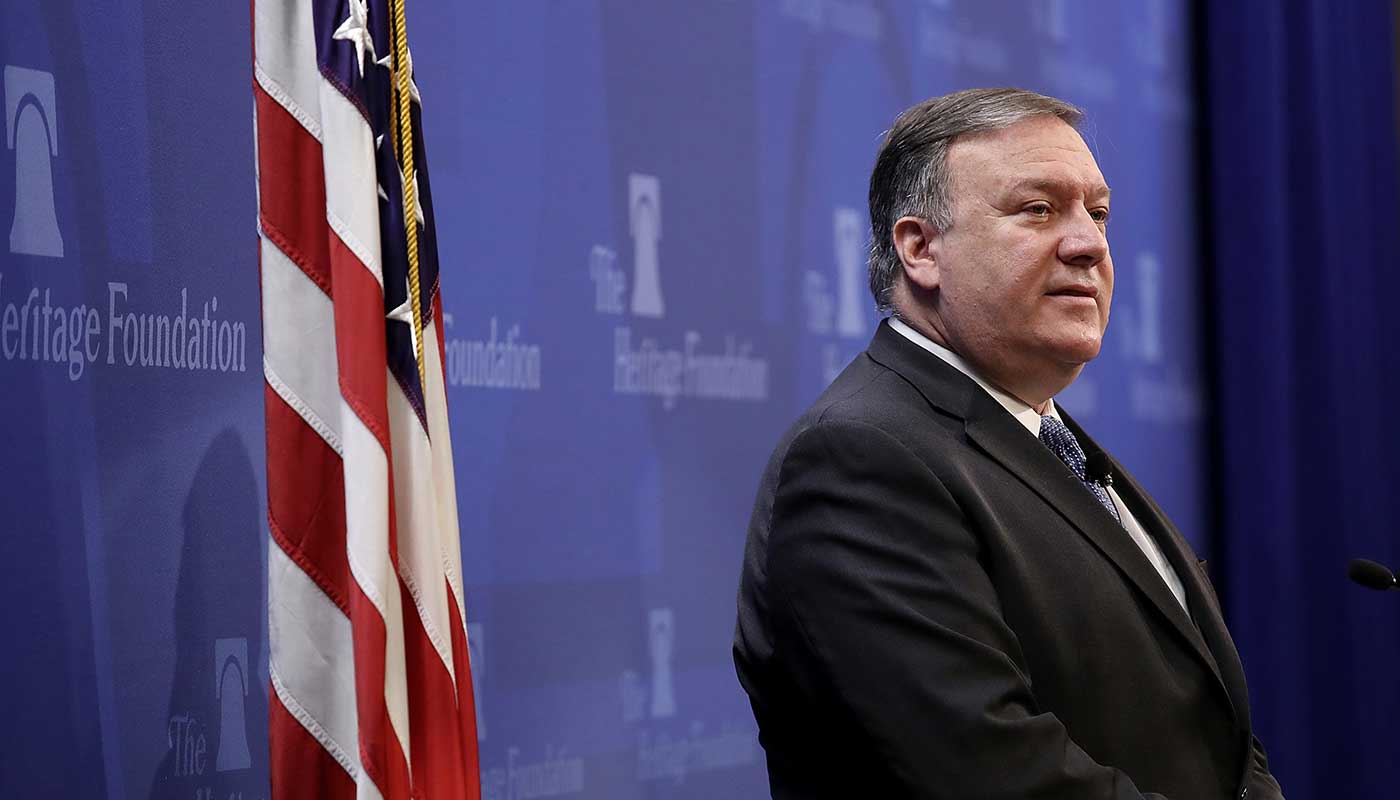‘Nuclear plan B’: how the US intends to confront Iran
Mike Pompeo threatens ‘strongest sanctions in history’ and hints of long-term regime change

A free daily email with the biggest news stories of the day – and the best features from TheWeek.com
You are now subscribed
Your newsletter sign-up was successful
Mike Pompeo has used his first big speech as US Secretary of State to set out the Trump administration’s ‘Plan B’ for dealing with Iran following its decision to withdraw from the 2015 multilateral nuclear deal.
Speaking at the conservative Heritage Foundation policy group in Washington, the former CIA director said the US would never allow Iran to develop a nuclear weapon and would impose the “strongest sanctions in history” to force the regime to submit to its demands.
What will change?
The Week
Escape your echo chamber. Get the facts behind the news, plus analysis from multiple perspectives.

Sign up for The Week's Free Newsletters
From our morning news briefing to a weekly Good News Newsletter, get the best of The Week delivered directly to your inbox.
From our morning news briefing to a weekly Good News Newsletter, get the best of The Week delivered directly to your inbox.
“The sting of sanctions will be painful if the regime does not change its course from the unacceptable and unproductive path it has chosen to one that rejoins the league of nations,” Pompeo said.
Among what Al Jazeera has called an “onerous” list of 12 “basic requirements” the regime must sign up to, Pompeo insisted Iran must stop developing ballistic missiles, release Americans currently held in prisons in the country, and stop support of militant and terrorist groups in the Middle East and beyond.
He also crucially called for a ban on a heavy-water reactor, which is the most basic way to develop nuclear energy, says CNBC.
Is there any incentive for Iran?
A free daily email with the biggest news stories of the day – and the best features from TheWeek.com
While the harsh rhetoric was aimed squarely at leaders in Tehran, he also offered an olive branch to the Iranian people, saying that unlike previous administration, “The United States believe you deserve better”.
Pompeo pointed to the administration’s ongoing nuclear negotiations with North Korea as a model for a new agreement with Iran, with administration officials saying the plan is to assemble a global coalition to pressure Iran into negotiations on “a new security architecture” that goes beyond its nuclear programme.
Will it work?
“It is certainly tough but may be totally unrealistic” says the BBC’s Jonathan Marcus, arguing that “for sanctions to work they must be comprehensive”, but “compelling allies and other countries to abandon trade with Iran risks damaging a whole series of wider diplomatic relationships”.
Despite overtures to the Iranian people and paying lip-service to a continued diplomatic dialogue with the regime “many former officials, foreign diplomats and analysts are sceptical, both of the chances a broader pact can come together, and of the administration's interest in diplomacy with Iran” says CNN.
Is there an ulterior motive?
Many claim the real objective of the White House is to force Iran to pull back from regional activities in Syria and the Yemen, and ultimately push for regime change within Iran.
Trump’s new National Security Adviser John Bolton has previously advocated overthrowing Iran’s government.
Other have warned the new US approach is a hugely destabilising move, with CNN saying that “regardless of the administration's goals, the chances of miscalculation, especially with Israel and Saudi Arabia urging Trump to confront Tehran, are high”.
-
 Local elections 2026: where are they and who is expected to win?
Local elections 2026: where are they and who is expected to win?The Explainer Labour is braced for heavy losses and U-turn on postponing some council elections hasn’t helped the party’s prospects
-
 6 of the world’s most accessible destinations
6 of the world’s most accessible destinationsThe Week Recommends Experience all of Berlin, Singapore and Sydney
-
 How the FCC’s ‘equal time’ rule works
How the FCC’s ‘equal time’ rule worksIn the Spotlight The law is at the heart of the Colbert-CBS conflict
-
 Will increasing tensions with Iran boil over into war?
Will increasing tensions with Iran boil over into war?Today’s Big Question President Donald Trump has recently been threatening the country
-
 Epstein files topple law CEO, roil UK government
Epstein files topple law CEO, roil UK governmentSpeed Read Peter Mandelson, Britain’s former ambassador to the US, is caught up in the scandal
-
 Iran and US prepare to meet after skirmishes
Iran and US prepare to meet after skirmishesSpeed Read The incident comes amid heightened tensions in the Middle East
-
 Which way will Trump go on Iran?
Which way will Trump go on Iran?Today’s Big Question Diplomatic talks set to be held in Turkey on Friday, but failure to reach an agreement could have ‘terrible’ global ramifications
-
 Israel retrieves final hostage’s body from Gaza
Israel retrieves final hostage’s body from GazaSpeed Read The 24-year-old police officer was killed during the initial Hamas attack
-
 China’s Xi targets top general in growing purge
China’s Xi targets top general in growing purgeSpeed Read Zhang Youxia is being investigated over ‘grave violations’ of the law
-
 Panama and Canada are negotiating over a crucial copper mine
Panama and Canada are negotiating over a crucial copper mineIn the Spotlight Panama is set to make a final decision on the mine this summer
-
 Why Greenland’s natural resources are nearly impossible to mine
Why Greenland’s natural resources are nearly impossible to mineThe Explainer The country’s natural landscape makes the task extremely difficult